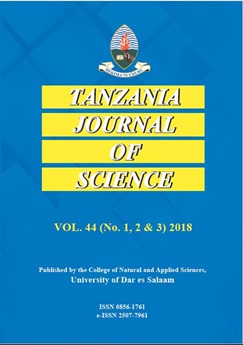Prevalence of Endoparasites and Haematology in Redbelly Tilapia from a Shallow Tropical Reservoir in Ghana
DOI:
https://doi.org/10.4314/tjs.v49i1.2Abstract
The goal of this study was to assess common endoparasites on Tilapia zillii in the Tono Reservoir, as well as to investigate the mean intensity and prevalence of these parasites. A total of 175 fish specimens were examined during the study. Endoparasites of three metazoans and one protozoan were observed from the Tilapia zillii gills, intestines, and stomach. The findings showed that the most common endoparasites affecting Tilapia zillii are Ichthyopthirius multifiliis, Bothriocephalus sp., Contracaecum sp., and Dactylogyrus sp. Also, Contracaecum sp had the highest prevalence of 29.71, followed by Bothriocephalus sp (18.86), Ichthyopthirius multifiliis (12), and Dactylogyrus sp (6.86). The average quantity of Bothriocephalus sp was 0.84, Contracaecum sp was 1.33, Dactylogyrus sp was 0.31, and Ichthyopthirius multifiliis was 0.54. The reservoir's physicochemical parameters changed every month due to inflows and other runoffs joining. Low levels of these parameters were discovered to influence the prevalence and distribution of these parasites. Haematological parameters showed significant changes between the adult and fingerling groups, where it was observed an improvement in health status in the adult group. It was also observed that fingerlings (0.1 €“20 g) were more infected, which significantly affected their blood profile.
Keywords: Tilapia zillii, endoparasite, blood profile, pathogenic effects, environmental stress


